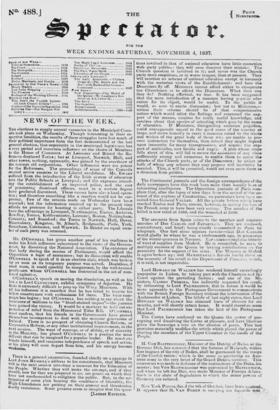Mr. O'CONNELL has given another proof of his readiness to
make his Irish influence subservient to the views of the Govern- ment, by dissolving the National Association. The existence of that body during the session of Parliament, would afford the Opposition a topic of annoyance; but its dissolution will enable O'CONNELL to speak of it as an election club, which was broken up us soon as its temporary purpose was served. Doubtless, if need were, it could speedily be reorganized, by the well-trained gentlemen whom O'CONNELL has instructed in the art of com- bined agitation. O'CoNNELL's speech on moving the dissolution, as well as his lettsr to Lord CLONCURRY, exhibit symptoms of dejection. He finds it extremely difficult to prop up the Whiz Ministers. With all his influence it is manifest that lie has failed to inspire his fellow countrymen with enthusiasm Mt them. The tithe cam- paign has begun ; but O'CONNELL has nothing to say about the resistance of millions to the " blood-stained impost"—the parsons hate gained the victory. It would be a mockery to hold out ex- pectation of relief from the Ministerial Tithe Bill. O'CONNELL num confess, that his friends in the Government hate proved themselves incompetent to deal with the monster grievances of Ireland. There is no prospect of' obtaining Church Reform, or Corporation Reform, or any other institutional improvement, in the next session. The want of courage, or of ability, or of sincerity Iii the Ministry, has placed O'CONNELL in a position the most difficult that can be imagined for a popular leader. He must ex- Meat° himself, and reassume independence of speech and action, or his glory will soon depart from him, and his energy become weakneu.


























